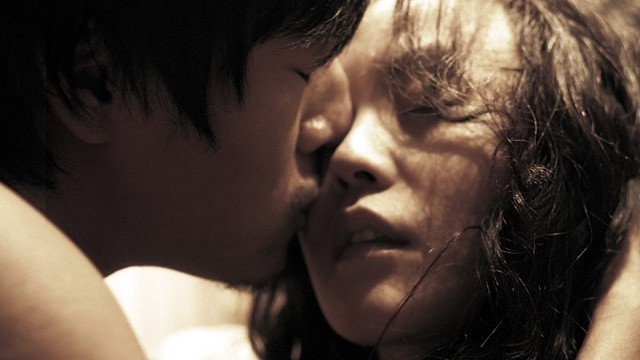
The 2013 New York Asian Film Festival runs June 28 – July 15. If you’re lucky enough to be in the area and interested in tickets check out the official NYAFF page here, but if not feel free to follow along with us as we take a look at several of the movies playing the fest this year.
As the name implies the festival presents new and select films from several countries including Japan, South Korea, Thailand, the Philippines, China, Taiwan, and Hong Kong.
Our fourth look at the films of NYAFF 2013 examines the evils that men (and women) do in the name of fame, madness and love.
Confession of Murder (South Korea)
Lieutenant Choi (Jung Jae-Young) has been on the trail of a serial killer responsible for the deaths of ten women, but as he closes in for the arrest the murderer stabs him, slices his face and escapes into the night. Fifteen years later the statute of limitations on the murders has expired and Lt. Choi is a beaten man, but then the unexpected happens. A man (Park Si-Hoo) claiming to be the killer gives a televised press conference to ask forgiveness from those he wronged and to announce his new tell all, detail-filled memoir of the murders. Choi may be faced with a legally untouchable murderer, but the families of the victims feel no such loyalty to the law, and soon everyone is on a collision course to see justice done one way or another.
Writer/director Jeong Byeong-Gil’s second film is actually his first narrative feature after his hit documentary about Korean stuntmen, Action Boys, but it unfurls with the confidence of a far more experienced filmmaker. It jumps right to chase, literally, by opening with a extended foot chase through alleys and restaurant windows and across walls and rooftops, and it is easily one of the most viscerally exciting opening scenes in memory. Jeong’s camera glides beneath cars, leaps out windows and stays with the two runners throughout the five minute scene, and it manages more thrills and suspense than many Hollywood action films do in their entirety.
Like many Korean films the movie doesn’t feel beholden to a singular tone resulting in a second act move into more lighthearted areas that for some viewers may feel jarring. It works though as it never gets too silly, well, aside from a car chase that manages to be both fun and absurd. The final forty five minutes or so gets back into the darkly suspenseful goods with a fairly chilling revelation and some fantastic dramatic set pieces including a live TV debate. Beyond the thrills, which are copious and exhilarating, the film also becomes a commentary on the cult of celebrity as the killer’s book becomes a bestseller and he’s mobbed by loving fans. The real world can’t be that far behind.
— – — – — – — – — —

Lesson of the Evil (Japan)
Seiji Hasumi (Hideaki Itô) is one of his school’s most popular teachers. Good looking and kind, he’s admired and beloved by the student body, but there’s something his students and fellow teachers don’t know about him. He’s batshit bonkers. He lives in a rundown shack in the woods where he spends his off-time killing crows in the buff, ruminating on Norse mythology and rinsing off the evidence from his other hobby. He’s a batshit bonkers murderer. His silent hobby moves into overdrive though when the disappointment he feels about students who cheat and bully each other turns into a homicidal need for punishment. As the class settles in at school for an overnight project Hasumi arrives to teach them all one final lesson.
It’s hard to get too upset when uber-prolific writer/director Takashi Miike turns out a dud, but one or two good films aside his constant genre hopping over the past decade plus has resulted in an extremely high percentage of watchable dreck. That incredibly long dry spell makes it all the more exciting to finally see him back in form with Lesson of the Evil. While a tonal 180 it’s easily his best film since 2001’s Happiness of the Katakuris and serves to remind us that the guy knows how to make visually impressive and affecting cinema. There’s a sharp and fluidly arresting style throughout accompanied by a blackly comic sense of humor, but when the final bloodletting begins we’re slammed into a wall of non-stop brutality. Miike’s not shy about showing his teenage protagonists being gunned down, and not even visible bursts of CGI blood (complementing the practical effects) can soften the horror on display.
Hasumi’s darker interests are made clear from the very beginning in a scene that gives a shout out to the Charles Bronson serial killer flick 10 to Midnight, and we also get to see a flashback to his college days attending Harvard and pairing up with a like-minded Caucasian killer classmate that calls to mind Patrick Bateman in one of several nods to Mary Harron’s adaptation of American Psycho. Additionally there are elements reminiscent of Kinji Fukasaku’s Battle Royale too, and not just because this movie won’t be getting a U.S. release anytime soon due to its excessive teen violence. But while it frequently reminds of other films Lesson of the Evil remains defiantly its own singular creation. With any luck Miike will gift us with a few more like this before returning to the realm of goofy kids fantasies.
— – — – — – — – — —

Mystery (China/France)
Spoiled rich kids race through the rainy streets oblivious to anyone outside of their own little world, and in the flash of a headlight one of the cars strikes a young woman standing in the road. Police arrive amid the chaos and discover the woman had been struck on the head with a rock before the fatal impact. The story then jumps to a married couple, Lu Jie (Hao Lei) and Yongzhao (Eric Qin Hao), who together with their young daughter live a comfortable, white-collar lifestyle. That calm serenity is shattered one day when Jie spots her husband entering a hotel in the arms of another woman. Passion and rage intertwine as the revelation unfolds further hidden truths showing love as both the weapon of choice and the victim.
Co-writer/director Lou Ye’s film is a drama first and foremost regardless of the mystery presented in the very beginning (and obviously the title). This is due in part to the mystery’s resolution being more than a little obvious, but also because that act serves mainly to ignite the fuse on the rest of the story. At its heart this is instead a story about love overshadowed by our darker, less dignified emotions. Infidelity, jealousy and obsession are unattractive but seemingly unavoidable for some people, and these characters (including friend/other woman Sang Qi played beautifully by Qi Xi) find tragedy amid the emotional devastation.
Ye has not set out to shoot a flashy film instead choosing to create a more raw and realistic look at these people and their story. The problem though comes in his decision to capture what transpires with tight cropping on their faces. The method is fine for immediacy and emotion, but it’s distressingly bad for viewers’ geographical awareness. Time spent catching up to who we’re looking at and where we are is time better served soaking in the suffering and building resolve. The performances prevent it from causing irreparable harm, but the disconnect is felt all the same.

